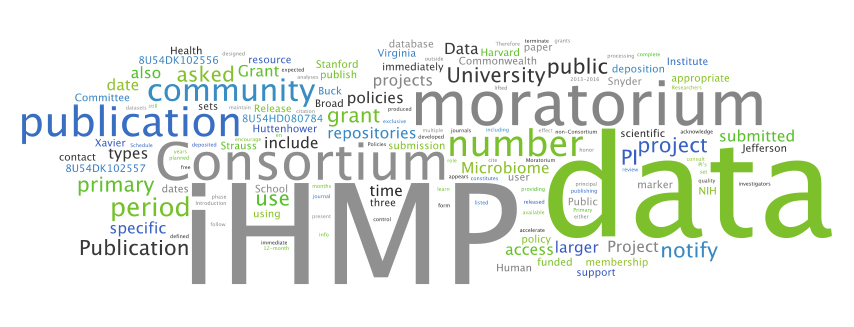Data Use Policy
The second phase of the Human Microbiome Project (fiscal year 2013-2015), henceforth known as the Integrative Human Microbiome Project (iHMP), is a community resource project to accelerate access to and use of iHMP data by the larger scientific community. All data use policies of the iHMP data are designed to support immediate access to the data by the larger scientific community while also providing an opportunity for the iHMP Consortium to complete analyses and publication of their primary datasets. The primary data release schedule, the publication moratorium, the procedure for iHMP Consortium membership and the process by which the larger user community can notify the Consortium of a planned publication using iHMP data are provided below and have all been developed to support the effective use and sharing of iHMP data, tools and resources.
The funded projects in the iHMP program with the Project Lead indicated (*) include:
- Grant number 8U54HD080784 to Gregory Buck* ( gabuck@vcu.edu ), Jerome Strauss, Kimberly Jefferson (Virginia Commonwealth University)
- Grant number 8U54DK102557 to Ramnik Xavier* ( xavier@molbio.mgh.harvard.edu ), Curtis Huttenhower (Broad Institute)
- Grant number 8U54DK102556 to Michael Snyder* ( mpsnyder@stanford.edu ) (Stanford University), George Weinstock (Jackson Laboratory)
For details about these longitudinal cohort studies, the data types that will be produced, the Consortium data analysis plans and the public repositories where these data will be archived, please consult the iHMP marker paper.

Primary Data Release Schedule and Publication Moratorium on Data
All primary data types including clinical metadata from the three funded iHMP projects will be immediately deposited in public repositories after appropriate quality control processing of the primary data. The specific data types and the public repositories for each project are listed in the iHMP marker paper and on each PI's project website (preterm birth study: http://vmc.vcu.edu/momspi, IBD onset study: http://ibdmdb.org, Type 2 Diabetes onset study: http://med.stanford.edu/ipop/) and on the iHMP Data Coordination Center (DCC) website ( http://hmpdacc.org ).
All primary data, though immediately available to the public in the repositories, will be subject to a publication moratorium.
- A publication moratorium is defined as a protected period of time during which the Consortium has an exclusive period of time to publish on or present on the data under moratorium. It is expected that no one other than the iHMP PI who produced the data or the iHMP Consortium will publish on data under moratorium.
- This publication moratorium period is 12 months from the date of data submission to a public database, or when the data are published, whichever comes first.
- Multiple data subsets will be submitted over the project period for longitudinal iHMP studies. Therefore, each submitted data subset will have its own moratorium period.
- The iHMP DCC will maintain a database of the primary data deposition dates so the moratoria on individual sets of data can be tracked for each project. Please contact the DCC ( http://www.hmpdacc.org/outreach/feedback.php ) to learn more about the data types and their release dates
- All iHMP data, regardless of deposition date, will be released from any moratorium two years after the iHMP grants terminate and the HMP program ends, i.e., Fall, 2018.
- This policy is in effect unless and until it is superseded by other NIH policy.
Researchers outside of the iHMP Consortium are free to use the iHMP data, either en masse or as specific subsets, but are being asked to honor the 12-month publication moratorium policy. Procedures for how the moratorium will be enforced are enumerated below.
- If you want to conduct longterm studies of the data under moratorium, please discuss your analysis plans with the iHMP PI or PIs who generated the data, establish collaborations with the iHMP investigators and apply for membership in the iHMP Consortium. Consortium membership form is here.
- If you are a new Consortium member who has been an active Consortium participant for at least nine months and who has presented ongoing work to the Consortium at least once, please notify the iHMP Publications Committee (iHMP PC) of your plans for any new analyses with a two-page abstract of your plan, including your proposed title, authors, the new specific dataset of interest, analysis plan, methods overview, and expected outcomes.
- If you are a non-Consortium user and you want to analyse a specific dataset, you will not be required to join the Consortium. Instead, we ask you to submit a two-page abstract of your plan to the iHMP PC, including your proposed title, authors, your specific dataset of interest, analysis plan, methods overview, and expected outcomes.
- In order to encourage the user community to follow the data access and publication moratorium policies, the iHMP Consortium will notify the appropriate journals of these policies.
- The iHMP Consortium will also notify a journal if a publication appears which used iHMP data that was still under moratorium at the time of the manuscript was submitted for review.
- When publishing on iHMP data after the moratorium has lifted, you are asked to cite the grant number(s), acknowledge the iHMP principal investigator(s) whose data you used and the HMP program. These include support from the NIH Common Fund for grant number 8U54HD080784 to Gregory Buck, Jerome Strauss, Kimberly Jefferson (Virginia Commonwealth University), grant number 8U54DK102557 to Ramnik Xavier, Curtis Huttenhower (Broad Institute) and grant number 8U54DK102556 to Michael Snyder (Stanford University) with additional co-funding from the National Center for Complementary and Alternative Medicine (NCCAM), the Office of Research on Women's Health (ORWH) and the Office of Dietary Supplements (ODS).






